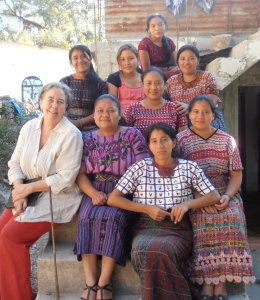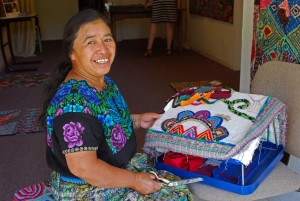Story by Kristin Breakell
The inspiration and artists behind a traveling exhibition of contemporary Guatemalan work at the Avenir Museum of Design and Merchandising are paying a visit to CSU.
The exhibition, by the textile artists of the Maya Women’s Rug Hooking Cooperative of Guatemala, is on display in the Avenir Gallery in the University Center for the Arts (Room 115).

Now some of the artists, as well as the inspiration behind the Cooperative, Mary Anne Wise, will be in attendance at the Avenir Museum. Special events include a Thursday evening lecture by Wise on April 7 and a rug hooking workshop with the artists on the weekend of April 9-10. The visit will also include a trunk show of rugs for sale throughout the four-day visit.
About the Cooperative
The Maya Women’s Rug Hooking Cooperative of Guatemala is a program that encourages Maya women to produce innovative textiles that combine the art of rug hooking with design elements and colors inspired by motifs present in traditional, hand-woven Maya clothing. The rugs symbolize innovation, artistic endeavor and economic empowerment.
Wise, president and co-owner of Cultural Cloth LLC, a socially responsible business in Maiden Rock, Wis., collaborates with the Maya women to produce these one-of-a-kind rugs. She is a seasoned rug hooker with 30 years of experience and connections to the international hooked-rug market.
Wise was captivated by the beauty and complexity of the woven textiles on her trip to Guatemala in 2006 and was inspired to help the Maya women use their artistic potential to escape the poverty and inequality prevalent among the indigenous population. She determined that rug hooking would be an inexpensive and compatible textile technique for the women and taught a rug hooking workshop in Guatemala in June 2009. The success of this first class led to seven more workshops in which she taught Guatemalan students more advanced drawing and design techniques. In 2012, a teacher training program was developed to advance the teaching and technical abilities of seven rug hookers who set out to teach rug hooking to disenfranchised women in their communities.
Widespread success
Today, more than 60 women across seven communities in Guatemala are now rug hooking. The women have sold their rugs at the International Folk Art Market in Santa Fe, and several have been exhibited in galleries in the United States and Canada.

Yolanda Sebastiana Calgua Morales, an ambassador for the Rug Hooking Project, has been producing rugs since 2009. Her first rug was made in memory of her grandmother and incorporated some of the designs from her grandmother’s huipil (traditional blouse), which had been passed down to her. With sales from her first rug, Yolanda connected six families in her village to clean, safe drinking water. Since then, she has supported her two children through high school and made improvements to her home. Her current building project includes a new workshop for her rug hooking group.
The Thursday, April 7, the evening lecture will take place at 7 p.m. in the Avenir Museum Linda Carlson Classroom, 216 E. Lake St., and will trace the story of the Maya Women’s Rug Hooking Cooperative. Wise will speak about the Cooperative as a vital endeavor based on Maya textile and cultural history, which also creates artistic and economic opportunity for women from the highlands of Guatemala. The lecture is free and open to the public.
The workshop
The two-day Guatemalan Rug Hooking Workshop will take place on Saturday and Sunday, April 9-10, from 9 a.m. to 4 p.m., also at the Avenir Museum Linda Carlson Classroom. Accomplished hooked rug artists Yessika Calgua Morales and Yolanda Sebastiana Calgua Morales, along with their colleague and translator Reyna Pretzantzin, will teach registered participants how to make hooked rugs using recycled clothing. Registration costs $150 per participant, and there is limited capacity for the workshop. For more information on how to register, click here.
Take advantage of the visit to enjoy extended visitor hours for the Avenir Museum. The museum will be open until 6:45 p.m. prior to the lecture on April 7, as well as from 9 a.m. to 4 p.m. on April 9-10. For more information on the Avenir Museum hours and exhibitions, see www.avenir.colostate.edu.
The Avenir Museum of Design and Merchandising is part of the Department of Design and Merchandising in CSU’s College of Health and Human Sciences.